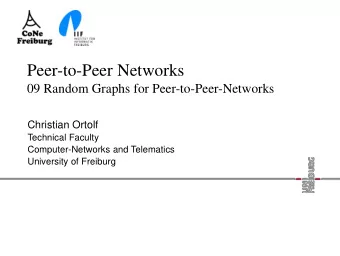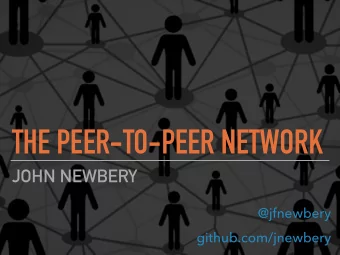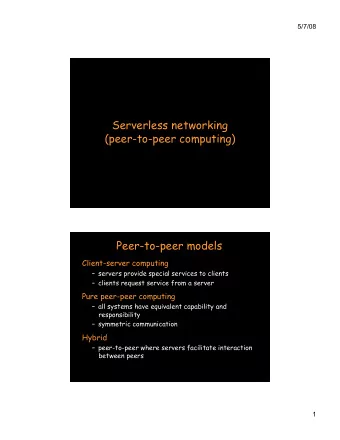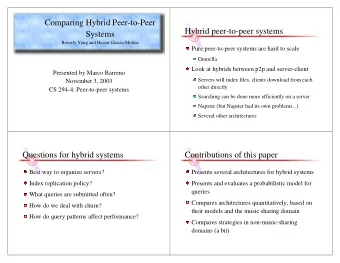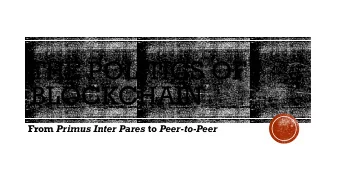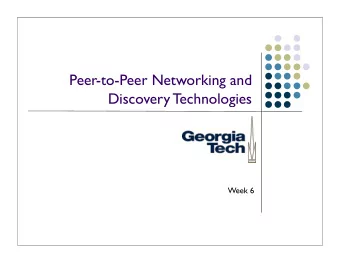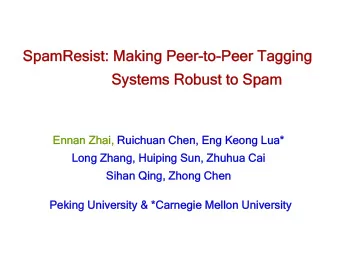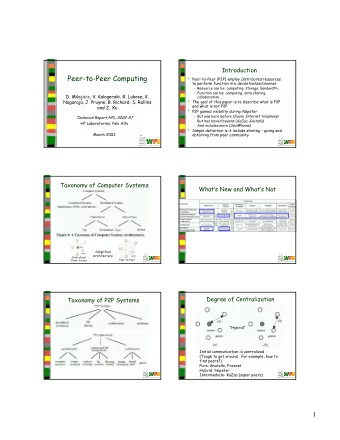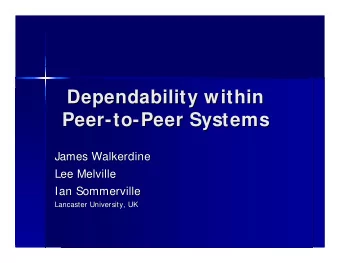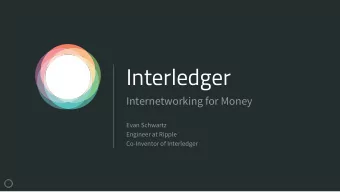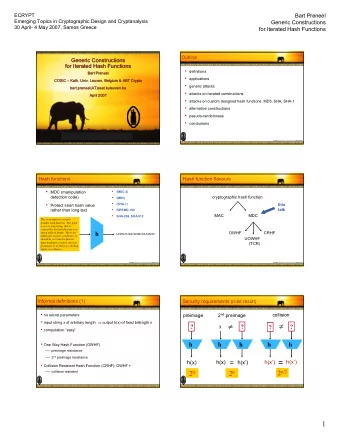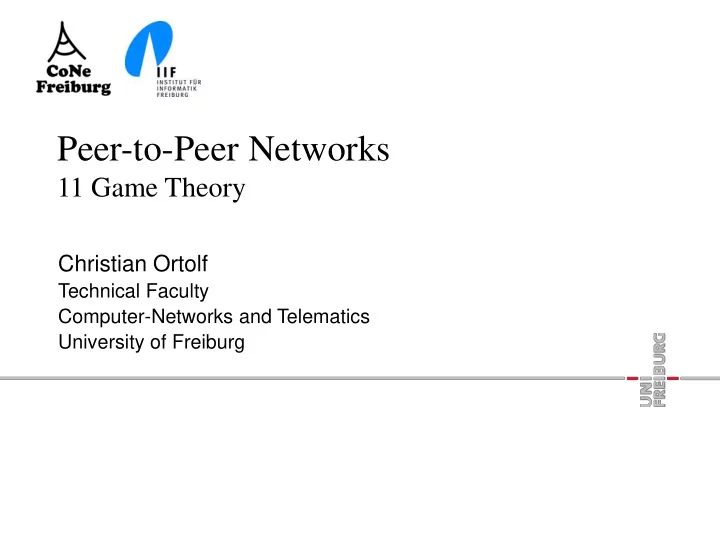
Peer-to-Peer Networks 11 Game Theory Christian Ortolf Technical - PowerPoint PPT Presentation
Peer-to-Peer Networks 11 Game Theory Christian Ortolf Technical Faculty Computer-Networks and Telematics University of Freiburg Literature Feldman, Chuang Overcoming Free -Riding Behavior in Peer-to- Peer Systems, 2005 Feldman,
Peer-to-Peer Networks 11 Game Theory Christian Ortolf Technical Faculty Computer-Networks and Telematics University of Freiburg
Literature Feldman, Chuang „Overcoming Free -Riding Behavior in Peer-to- Peer Systems“, 2005 Feldman, Lai, Stoica, Chuang, „Robust Incentive Techniques for Peer-to- Peer Networks“, 2004 Shneidman, Parkes, „Rationality and Self - Interest in Peer to Peer Networks“ 2
Motivation Traditional system design - assume obedient users - follow specific protocol without consideration - classes of nodes: • correct/obedient • faulty - fail-stop - message dropping - Byzantine failure P2P - have rational users - maximize own utility - may deviate from the protocol 3 - classes of nodes
Examples Gnutella - study by Adar & Huberman 2000 • ~70% of peers provide no files (free-riders) • top 1% provide 37% of all files - similar patterns in studies of Napster - in 2005: 85% of all Gnutella users are free-riders 4
Selfish Behavior in P2P Reasons - Psychology of users - Lack of central authority - Highly dynamic memberships - Availability of cheap identities - Hidden or untraceable actions - Deceitful behavior Implications - Success of P2P networks must take into account economic behavior of users 5
Typical Features of Peer to Peer Systems Social dilemma - defective behavior (not uploading) is rational behavior, i.e. maximise the utility Asymmetric transactions - a peer wants a service - another provides this service Untraceable defections - it is not clear which peer declines a service Dynamic population - peers change the behavior - peers enter and leave the system 6
Incentives for Cooperation Inherent generosity Monetary payment schemes Reciprocity-based schemes 7
Inherent Generosity Standard model of behavioral economics - based on purely self-interest - does not explain all behavior of people User generosity has a great impact on existing peer-to-peer systems - can not be determined analytically 8
Monetary Payment Schemes Golle, Leyton-Brown, Mironov, Lillibridge 2001, „Incentives for Sharing in peer -to-peer Networks“ - consider free-rider problem in Napster - assume selfish behavior - if all peers are selfish this leads to the strict Nash equilibrium - introduce micro-payment system to overcome this problem - encourage positive behavior by virtual money 9
Basics of Game Theory Prisoner‘s dilemma (Flood&Drescher 1950) - two suspects arrested A talks A is silent - if one testifies and the other remains silent then the witness is released the other serves 10 years prison - if both testify then both serve 7 years A: -7 A: -10 prison B talks B: -7 B: 0 - if no one testify then they receive 2 years prison Best social strategy - no one testifies A: 0 A: -2 B is silent Nash equilibrium B: -10 B: -2 - for a constant choice of the other party each player optimizes his benefit - if both talk then there is a Nash equilibrium 10
Dominant Strategy Dominant strategy - a strategy is dominant if it is always better than every other A talks A is silent strategy - in the prisoner‘s dilemma every player has a dominant strategy A: -7 A: -10 • talk! B talks B: -7 B: 0 Nash equilibrium - for a constant choice of the other party each player A: 0 A: -2 B is silent optimizes his benefit B: -10 B: -2 - if both talk then there is a Nash equilibrium - is not necessary Pareto-optimal 11
Prisoner‘s Dilemma of Peer to Peer Filesharing Rational strategy for U: Peer U: Peer downloading peer: rejects uploads upload - Download Rational strategy for uploading peer: D: 0 D: Peer D: 10 U: -1 downloads U: 0 - Don‘t upload Nash equilibrium - Uploader rejects D: 0 D: 0 D: Peer does not download upload for downloader U: 0 U: 0 12
Bittorrent Bram Cohen Bittorrent is a real (very successful) peer-to-peer network - concentrates on download - uses (implicitly) multicast trees for the distribution of the parts of a file Protocol is peer oriented and not data oriented Goals - efficient download of a file using the uploads of all participating peers - efficient usage of upload • usually upload is the bottleneck • e.g. asymmetric protocols like ISDN or DSL - fairness among peers • seeders against leeches - usage of several sources 13
Bittorrent Coordination and File Central coordination - by tracker host - for each file the tracker outputs a set of random peers from the set of participating peers • in addition hash-code of the file contents and other control information - tracker hosts to not store files • yet, providing a tracker file on a tracker host can have legal consequences File - is partitions in smaller pieces • as described in tracker file - every participating peer can redistribute downloaded parts as soon as he received it - Bittorrent aims at the Split-Stream idea Interaction between the peers - two peers exchange their information about existing parts - according to the policy of Bittorrent outstanding parts are transmitted to the other peer 14
Bittorrent Part Selection Problem - The Coupon-Collector-Problem is the reason for a uneven distribution of parts if a completely random choice is used Measures - Rarest First • Every peer tries to download the parts which are rarest - density is deduced from the comunication with other peers (or tracker host) • in case the source is not available this increases the chances the peers can complete the download - Random First (exception for new peers) • When peer starts it asks for a random part • Then the demand for seldom peers is reduced - especially when peers only shortly join - Endgame Mode • if nearly all parts have been loaded the downloading peers asks more connected peers for the missing parts • then a slow peer can not stall the last download 15
Bittorrent Policy Goal - self organizing system - good (uploading, seeding) peers are rewarded - bad (downloading, leeching) peers are penalized Reward - good download speed - un-choking Penalty - Choking of the bandwidth Evaluation - Every peers Peers evaluates his environment from his past experiences 16
Bittorrent Choking Every peer has a choke list - requests of choked peers are not served for some time - peers can be unchoked after some time Adding to the choke list - Each peer has a fixed minimum amount of choked peers (e.g. 4) - Peers with the worst upload are added to the choke list • and replace better peers Optimistic Unchoking - Arbitrarily a candidate is removed from the list of choking candidates • the prevents maltreating a peer with a bad bandwidth 17
Alternatives for BitTorrent Rational strategy for downloading U: Peer U: Peer peer: rejects uploads upload - Download Rational strategy D: 0 D: Peer D: 7 U: 3 downloads U: 0 for uploading peer: D: Peer D: 0 D: 0 does not - Now: upload U: 0 U: 0 download Nash equilibrium - Uploading and Downloading 18
Other Possible Mechanisms: Monetary Payment Schemes Advantage - allow to use economic mechanisms - charge free-riders for misbehavior Disadvantage - require infrastructure for accounting and micropayments Major problems - how to encourage truthful relevation of costs • solution: Vickrey-Clarke-Groves (VCG-mechanisms) • strategyproof mechanism - encourage truthful revelation in dominant strategies - how to encourage cooperate behavior despite hidden actions • information asymmetry • use contracts - how to deliver the payment • e.g. the deliverer also receives some part of the payment 19
Mechanism Design Define rules of the games - such that rational behavior is good behavior • e.g. auction system: second best wins Inverse game theory - how to design the rules such that the desired outcome occurs - provide incentives Obedient center - the rule system must be enforced on all the nodes - altruistic rule maker - central control or distributed software control mechanism or cryptography Mechanism design can be computationally hard - calculating the optimal strategy can be difficult - not all the information may be available to each player - finding the best rule system poses an even more difficult problem Algorithmic Mechanism Design - Mechanism is carried out via a distributed computation 20
Reciprocity based Schemes Reciprocity based schemes - Users maintain histories of past behavior of other users - used for decision making Direct-reprocity scheme - A decides how to serve user B based solely on the service that B has provided - e.g. Bittorrent - still possibilities for manipulation Indirect-reciprocity scheme - aka. reputation based schemes - more scalable for • large population sizes • highly dynamic memberships • infrequent repeat transactions 21
Problems - How to treat newcomers? • whitewashing attacks • irreplacable pseudonyms • penalty for newcomers - Indirect reciprocity is vulnerable to deceits, false accusations & false praises • sybil attacks • sybilproofness
Recommend
More recommend
Explore More Topics
Stay informed with curated content and fresh updates.
